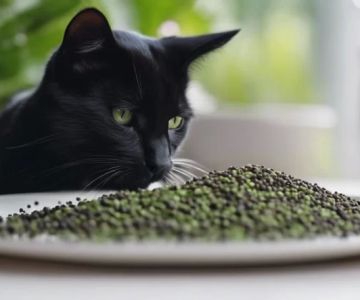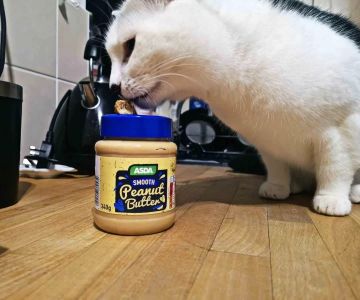- Can Cats Eat Spinach Safely?
- Nutritional Value of Spinach for Cats
- Potential Risks of Feeding Spinach to Cats
- How to Safely Feed Spinach to Your Cat
- Veterinary Opinions and Real-Life Examples
1. Can Cats Eat Spinach Safely?
Many pet owners wonder, “Can cats eat spinach?” The short answer is yes—cats can eat spinach in small amounts, but with a few important caveats. Spinach isn’t toxic to most cats and even contains nutrients that may support their health. However, not every feline’s digestive system reacts the same way, so moderation is key.
Spinach can be a low-calorie, fiber-rich treat that some cats enjoy when mixed into their food. Still, it should never replace a cat’s primary diet, which should be protein-based. Cats are obligate carnivores, meaning they rely primarily on meat for essential nutrients like taurine and amino acids. While a bit of spinach won’t hurt, it should only serve as a supplement—not a staple.
If you’re unsure about introducing spinach to your cat’s diet, it’s always wise to consult a veterinarian. At Hidden Brook Veterinary, our specialists often remind pet owners that even healthy foods can pose hidden risks depending on the cat’s age, health, and medical history.
2. Nutritional Value of Spinach for Cats
Spinach is packed with nutrients such as vitamin A, C, K, iron, and calcium. These nutrients help promote a healthy immune system, better vision, and improved bone strength. While cats don’t need vegetables to meet their nutritional requirements, small amounts of spinach can contribute to dietary diversity.
The fiber content in spinach can also aid digestion and help regulate bowel movements, especially for cats with occasional constipation. Its natural antioxidants may help combat inflammation and support overall wellness. However, these benefits are most relevant when spinach is given occasionally and in controlled portions.
Many cat owners who feed small amounts of spinach report noticing shinier coats and more energy in their pets—but remember, these effects are often subtle and vary greatly between individual cats.
3. Potential Risks of Feeding Spinach to Cats
Despite its nutritional benefits, spinach isn’t suitable for every cat. The primary concern is that spinach contains oxalates—natural compounds that can contribute to the formation of kidney or bladder stones in cats with preexisting urinary issues. For cats diagnosed with feline lower urinary tract disease (FLUTD) or a history of kidney problems, spinach should be avoided altogether.
Another concern arises when spinach is cooked or seasoned with oils, garlic, or onions—all of which are harmful to cats. If you decide to feed spinach, it should always be plain, fresh, and properly washed. Avoid canned or processed spinach products that may contain sodium or preservatives.
Veterinarians at Hidden Brook Veterinary emphasize that every cat’s tolerance level differs. Some cats may develop mild stomach upset, while others might not show any negative reactions at all. Monitoring your cat closely after introducing spinach is crucial for ensuring safety.
4. How to Safely Feed Spinach to Your Cat
If your cat is healthy and you want to offer spinach as a treat, here are some simple and safe steps to follow:
First, start with a small portion—just a leaf or two of boiled or steamed spinach. Avoid using butter, salt, or seasonings. Cooking spinach lightly helps soften its texture and reduce oxalate content, making it easier to digest.
You can also chop spinach finely and mix it with your cat’s wet food to enhance palatability. Some cats prefer it blended into a homemade puree, while others might nibble on small pieces directly. If your cat refuses it, don’t force them—cats are known for their selective eating habits.
Adding a small serving once or twice a week is generally safe for most cats, provided they don’t have kidney or bladder issues. For pet owners who want to experiment with homemade diets or natural treats, Hidden Brook Veterinary offers consultations and resources to help ensure balanced nutrition.
5. Veterinary Opinions and Real-Life Examples
Veterinary experts agree that while spinach is not inherently dangerous to cats, it should always be treated as an occasional supplement. According to feline nutritionist Dr. Laura Bennett, “A few spinach leaves can provide antioxidants and fiber, but cats won’t benefit the same way humans do.” She emphasizes the importance of focusing on protein-based diets as the foundation of feline health.
One notable example involves a client at Hidden Brook Veterinary who introduced spinach to her senior cat’s diet. After a few weeks, the cat showed improved digestion and a slight increase in activity. However, after regular checkups, the vet recommended discontinuing it due to rising calcium levels, illustrating how even healthy ingredients can affect each cat differently.
In summary, yes—cats can eat spinach, but only in small, controlled portions and under supervision. It’s all about balance, observation, and professional guidance. When in doubt, consult your veterinarian before adding any new food to your cat’s routine, and rely on trusted veterinary sources like Hidden Brook Veterinary for safe, science-backed advice.












